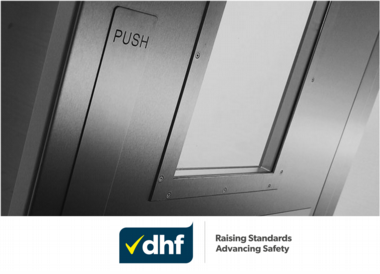
Steve Hill, Senior Training & Compliance Officer at DHF highlights the reasons why correct maintenance of doors plays a critical role in saving lives.
Maintenance of doors is essential for reasons of legal compliance, functionality, and safety. Depending on the intended use of the door, building owners or managers may be bound by the Health and Safety at Work Act 1974, The Workplace (Health Safety and Welfare) Regulations 1992 and The Regulatory Reform (Fire Safety) Order 2005. Specialist contractors are often required for door maintenance, and they should be experienced with the specific doors on the site due to variations in maintenance requirements. Some sites will include a variety of door types, all of which will have their own requirements for maintenance.
Maintenance encompasses both the proper functioning of doorsets and their safety, particularly in the case of fire-resistant doors. A fire resisting door which does not close fully, or a fire exit door which does not allow exit due to faulty hardware, or additional locking systems fitted post installation will be a major threat to life if they do not perform their intended function when required. Maintenance will need to include the general condition of the door leaf, the frame, the fixings as well as the condition and operation of all hardware. Door closers on fire resisting doors in residential premises have specific requirements for inspection to comply with current legislation.
Where problems are found by the maintenance contractor, they should try in the first instance to adjust operation or fixings in order to maintain operation as designed. Where replacement equipment is required, careful consideration must be given to the items used. Wherever possible components from the original manufacturer should be used. Otherwise, replacements as close as possible to the original should be used, requiring minimal adjustment to the door. Some designs of door, predominantly those of metal construction, will require that replacement components are either those of the original design, or have dimensions identical to the original due to the manufacturing process. Other doors such as timber or composite doors may allow additional flexibility.
Replacement components take on a critical importance when doors which carry any form of certification are involved. Any substitution not approved by the manufacturer will in all probability affect, or even negate the certification. Any request to use replacements not approved by the initial certification will need to be passed to the certification body for approval to avoid losing it.
Maintenance of doors should never be a “box ticking” exercise. It is a vital part of the overall safety strategy of a building.
DHF works collaboratively with BRE to provide training courses for the installation, repair and maintenance of timber and steel fire doors; further information can be found here https://bre.ac/fire/#jump_to_tfd
DHF has recently launched a Security & Emergency Exit (non-fire) course that covers standards and legislation relating to doorsets as well as the possibilities for and limitations on the modification of specific door types. For further information regarding this and other courses available from DHF visit: www.dhfonline.org.uk/training
15th December 2023
Join dhf
Enjoy the full benefits of dhf membership
Apply today